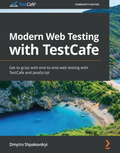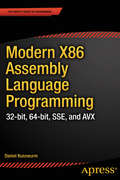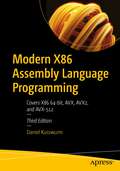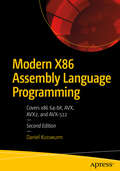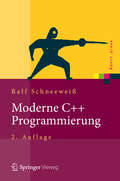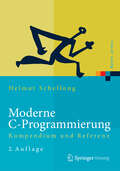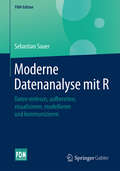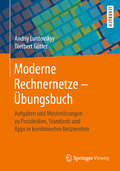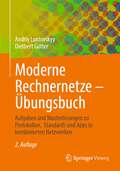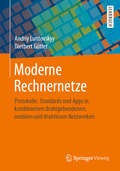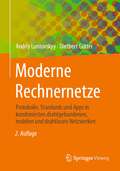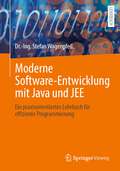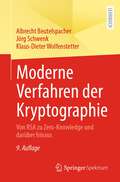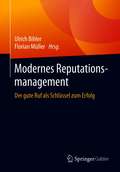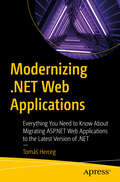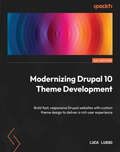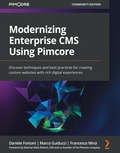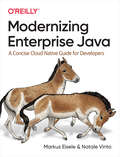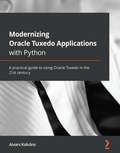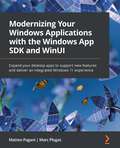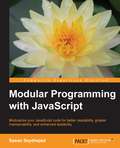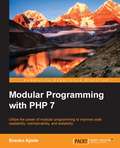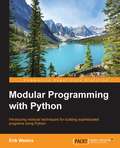- Table View
- List View
Modern Web Testing with TestCafe: Get to grips with end-to-end web testing with TestCafe and JavaScript
by Dmytro ShpakovskyiThe book is for QA professionals, test engineers, software engineers, and test automation enthusiasts looking for hands-on guidance on learning about TestCafe. This book is also great for full-stack developers who want to learn more about new tools for testing their code. The book assumes a basic understanding of JavaScript, Node.js, HTML, and CSS.
Modern X86 Assembly Language Programming
by Daniel KusswurmModern X86 Assembly Language Programming shows the fundamentals of x86 assembly language programming. It focuses on the aspects of the x86 instruction set that are most relevant to application software development. The book's structure and sample code are designed to help the reader quickly understand x86 assembly language programming and the computational capabilities of the x86 platform. Book appendixes can be downloaded here: http: //www. apress. com/9781484200650?gtmf=sMajor topics of the book include the following:32-bit core architecture, data types, internal registers, memory addressing modes, and the basic instruction setX87 core architecture, register stack, special purpose registers, floating-point encodings, and instruction setMMX technology and instruction setStreaming SIMD extensions (SSE) and Advanced Vector Extensions (AVX) including internal registers, packed integer arithmetic, packed and scalar floating-point arithmetic, and associated instruction sets64-bit core architecture, data types, internal registers, memory addressing modes, and the basic instruction set64-bit extensions to SSE and AVX technologiesX86 assembly language optimization strategies and technique
Modern X86 Assembly Language Programming: Covers X86 64-bit, AVX, AVX2, and AVX-512
by Daniel KusswurmThis book is an instructional text that will teach you how to code x86-64 assembly language functions. It also explains how you can exploit the SIMD capabilities of an x86-64 processor using x86-64 assembly language and the AVX, AVX2, and AVX-512 instruction sets.This updated edition’s content and organization are designed to help you quickly understand x86-64 assembly language programming and the unique computational capabilities of x86 processors. The source code is structured to accelerate learning and comprehension of essential x86-64 assembly language programming constructs and data structures. Modern X86 Assembly Language Programming, Third Edition includes source code for both Windows and Linux. The source code elucidates current x86-64 assembly language programming practices, run-time calling conventions, and the latest generation of software development tools.What You Will LearnUnderstand important details of the x86-64 processor platform, including its core architecture, data types, registers, memory addressing modes, and the basic instruction setUse the x86-64 instruction set to create assembly language functions that are callable from C++Create assembly language code for both Windows and Linux using modern software development tools including MASM (Windows) and NASM (Linux)Employ x86-64 assembly language to efficiently manipulate common data types and programming constructs including integers, text strings, arrays, matrices, and user-defined structuresExplore indispensable elements of x86 SIMD architectures, register sets, and data types.Master x86 SIMD arithmetic and data operations using both integer and floating-point operandsHarness the AVX, AVX2, and AVX-512 instruction sets to accelerate the performance of computationally-intense calculations in machine learning, image processing, signal processing, computer graphics, statistics, and matrix arithmetic applicationsApply leading-edge coding strategies to optimally exploit the AVX, AVX2, and AVX-512 instruction sets for maximum possible performanceWho This Book Is ForSoftware developers who are creating programs for x86 platforms and want to learn how to code performance-enhanced algorithms using the core x86-64 instruction set; developers who need to learn how to write SIMD functions or accelerate the performance of existing code using the AVX, AVX2, and AVX-512 instruction sets; and computer science/engineering students or hobbyists who want to learn or better understand x86-64 assembly language programming and the AVX, AVX2, and AVX-512 instruction sets.
Modern X86 Assembly Language Programming: Covers x86 64-bit, AVX, AVX2, and AVX-512
by Daniel Kusswurm<p>Gain the fundamentals of x86 64-bit assembly language programming and focus on the updated aspects of the x86 instruction set that are most relevant to application software development. This book covers topics including x86 64-bit programming and Advanced Vector Extensions (AVX) programming. <p>The focus in this second edition is exclusively on 64-bit base programming architecture and AVX programming. Modern X86 Assembly Language Programming’s structure and sample code are designed to help you quickly understand x86 assembly language programming and the computational capabilities of the x86 platform. After reading and using this book, you’ll be able to code performance-enhancing functions and algorithms using x86 64-bit assembly language and the AVX, AVX2 and AVX-512 instruction set extensions. <p>What You Will Learn: <p> <li>Discover details of the x86 64-bit platform including its core architecture, data types, registers, memory addressing modes, and the basic instruction set <li>Use the x86 64-bit instruction set to create performance-enhancing functions that are callable from a high-level language (C++) <li>Employ x86 64-bit assembly language to efficiently manipulate common data types and programming constructs including integers, text strings, arrays, and structures <li>Use the AVX instruction set to perform scalar floating-point arithmetic <li>Exploit the AVX, AVX2, and AVX-512 instruction sets to significantly accelerate the performance of computationally-intense algorithms in problem domains such as image processing, computer graphics, mathematics, and statistics <li>Apply various coding strategies and techniques to optimally exploit the x86 64-bit, AVX, AVX2, and AVX-512 instruction sets for maximum possible performance</li> <p> <p>Who This Book Is For: <p> <p>Software developers who want to learn how to write code using x86 64-bit assembly language. It’s also ideal for software developers who already have a basic understanding of x86 32-bit or 64-bit assembly language programming and are interested in learning how to exploit the SIMD capabilities of AVX, AVX2 and AVX-512.</p>
Moderne C++ Programmierung
by Ralf SchneeweißC++ ist eine objektorientierte Programmiersprache - neben der Objektorientierung gewinnt aber die generische Programmierung zunehmend an Bedeutung. Das Buch liefert eine fundierte Darstellung des modernen Programmdesigns in C++ gemäß dem ANSI- bzw. dem ISO-Standard. Der Autor behandelt zunächst die grundlegenden Sprachelemente von C++, dann erläutert er detailliert die klassische objektorientierte Modellierung sowie die modernen Techniken der generischen oder aspektorientierten Programmierung mittels Templates und Design Patterns.
Moderne C-Programmierung
by Helmut SchellongDieses Buch wendet sich an Entwickler, die bereits über erste Erfahrungen in der Programmierung verfügen. Es fördert den effizienten, strukturierten Umgang mit C. Das vorgestellte Detailwissen hilft zudem bei der Entwicklung eigener Ideen und Konzepte für vielfältige Anwendungsgebiete und zeigt viele Feinheiten der Sprache. Einen Schwerpunkt der Darstellung bildet der Einsatz von C in der Programmierpraxis: PC-Programme, Mikrocontroller, Skripte. Dazu werden effiziente Lösungen anhand konkreter Kodebeispiele vorgestellt. Der Text wird durch verschiedene kompakte C-Referenzen in übersichtlicher Listen- oder Tabellenform ergänzt und vervollständigt. 380 Kodeabschnitte des Buches in Farbe sind abrufbar unter http://www. schellong. de/htm/code. html
Moderne Datenanalyse mit R: Daten einlesen, aufbereiten, visualisieren, modellieren und kommunizieren (FOM-Edition)
by Sebastian SauerDie Kaufempfehlung, die Ihnen ein Webstore ausspricht, die Einschätzung, welcher Kunde kreditwürdig ist, oder die Analyse der Werttreiber von Immobilien – alle diese Beispiele aus dem heutigen Leben sind Ergebnis moderner Verfahren der Datenanalyse. Dieses Buch führt in solche statistische Verfahren anhand der Programmiersprache R ein. Ziel ist es, Leser mit der Art und Weise vertraut zu machen, wie führende Organisationen und Praktiker angewandte Statistik heute einsetzen. Weil sich mit der Digitalisierung auch die statistischen Verfahren verändert haben, vermittelt der Autor neben klassischen Analysemethoden wie Regression auch moderne Methoden wie Textmining und Random-Forest-Modelle. Dabei sind die Inhalte des Buchs durchgehend so aufbereitet, dass sie auch für Leser ohne umfangreiche mathematische Vorkenntnisse verständlich sind. Anhand von Fallbeispielen und Übungen werden die Leser durch alle Phasen der Datenanalyse geführt: Sie lernen, wie Daten eingelesen, aufbereitet, visualisiert, modelliert und kommuniziert werden können. Dabei wird vor allem die Aufbereitung, Umformung und Prüfung der Daten ausführlicher als in anderen Publikationen behandelt, da dieser Teil in der Praxis oft einen wesentlichen Teil des Aufwands ausmacht. Aber auch die Visualisierung bekommt viel Raum, denn gute Diagramme ermöglichen Einblicke, die Zahlen und Worte verbergen.Mit seinem praxisorientierten Ansatz will das Buch dazu befähigen,alle grundlegenden Schritte eines Datenanalyseprojekts durchzuführen,Daten kompetent in R zu bearbeiten,simulationsbasierte Inferenzstatistik anzuwenden und kritisch zu hinterfragen,klassische und moderne Vorhersagemethoden anzuwenden undbetriebswirtschaftliche Fragestellungen mittels datengetriebener Vorhersagemodelle zu beantworten.Sowohl Anwender ohne statistisches Grundlagenwissen als auch Nutzer mit Vorerfahrung lesen dieses Buch mit Gewinn. In verständlicher Sprache und anhand von anschaulichen Beispielen zeigt der Autor, wie moderne Datenanalyse heute funktioniert.
Moderne Rechnernetze - Übungsbuch: Aufgaben und Musterlösungen zu Protokollen, Standards und Apps in kombinierten Netzwerken
by Andriy Luntovskyy Dietbert GütterDieses Übungsbuch ergänzt das Lehrbuch "Luntovskyy/Gütter, Moderne Rechnernetze: Protokolle, Standards und Apps in kombinierten drahtgebundenen, mobilen und drahtlosen Netzwerken" um praktische Übungen und dazugehörige Musterlösungen.Die Übungen und Musterlösungen werden den Teilen I, II, III im Lehrbuch zugeordnet und folgen damit dem modularen Aufbau des o.g. Lehrbuchs.Lehrbuch und Übungsbuch eignen sich als vorlesungsbegleitende Literatur zum Modul Computernetzwerke im ET- und IT-Fachstudium für Studierende und Dozenten an technischen Hochschulen.
Moderne Rechnernetze – Übungsbuch: Aufgaben und Musterlösungen zu Protokollen, Standards und Apps in kombinierten Netzwerken
by Andriy Luntovskyy Dietbert GütterDieses Übungsbuch ergänzt das Lehrbuch "Luntovskyy/Gütter, Moderne Rechnernetze: Protokolle, Standards und Apps in kombinierten drahtgebundenen, mobilen und drahtlosen Netzwerken" um praktische Übungen und dazugehörige Musterlösungen.Die Übungen und Musterlösungen werden den Teilen I, II, III im Lehrbuch zugeordnet und folgen damit dem modularen Aufbau des o.g. Lehrbuchs.Lehrbuch und Übungsbuch eignen sich als vorlesungsbegleitende Literatur zum Modul Computernetzwerke im ET- und IT-Fachstudium für Studierende und Dozenten an technischen Hochschulen.
Moderne Rechnernetze: Protokolle, Standards und Apps in kombinierten drahtgebundenen, mobilen und drahtlosen Netzwerken
by Andriy Luntovskyy Dietbert GütterDas Buch mit einem stark ausgeprägten modularen Aufbau, wird als ein vorlesungsbegleitendes Lehrbuch zum Modul Computernetzwerke im ET- und IT-Fachstudium an technischen Hochschulen empfohlen und enthält drei Teile sowie Zwischenfragen mit dazugehörigen Lösungen und weitere Übungsaufgaben. Teil I beinhaltet eine Einführung in das Gebiet der Rechnernetze. Die weiterführenden Teile II und III behandeln aktuelle Rechnernetztechnologien, Kopplungselemente und Verkabelungskonzepte. Die Leser werden dabei mit verteilten Softwaresystemen und Rechnernetzanwendungen vertraut gemacht.
Moderne Rechnernetze: Protokolle, Standards und Apps in kombinierten drahtgebundenen, mobilen und drahtlosen Netzwerken
by Andriy Luntovskyy Dietbert GütterDas Buch mit einem stark ausgeprägten modularen Aufbau, wird als ein vorlesungsbegleitendes Lehrbuch zum Modul Computernetzwerke im ET- und IT-Fachstudium an technischen Hochschulen empfohlen und enthält drei Teile sowie Zwischenfragen mit dazugehörigen Lösungen und weitere Übungsaufgaben. Teil I beinhaltet eine Einführung in das Gebiet der Rechnernetze. Die weiterführenden Teile II und III behandeln aktuelle Rechnernetztechnologien, Kopplungselemente und Verkabelungskonzepte. Die Leser werden dabei mit verteilten Softwaresystemen und Rechnernetzanwendungen vertraut gemacht.
Moderne Software-Entwicklung mit Java und JEE: Ein praxisorientiertes Lehrbuch für effiziente Programmierung
by Dr.-Ing. Stefan WagenpfeilIn diesem Buch werden die Programmierkonzepte der Sprache Java und der JEE vorgestellt. Eine methodische Abgrenzung zu anderen Programmiersprachen wird durchgeführt, um die Kerneigenschaften von objektorientierter Entwicklung mit Java im Vergleich zu anderen Sprachen herauszuarbeiten. Ein besonderer Fokus liegt auf dem praxistauglichen Einsatz der Konzepte. Daher wird von Beginn an ein starker Projekt- und Realitätsbezug hergestellt, der den Leser*innen konkrete Hilfestellung bietet, um sich in der schnell wachsenden und wechselnden Welt der Softwareentwicklung zurechtzufinden.
Moderne Verfahren der Kryptographie: Von RSA zu Zero-Knowledge und darüber hinaus
by Jörg Schwenk Albrecht Beutelspacher Klaus-Dieter WolfenstetterDie Entwicklung und Analyse von Protokollen wird ein immer wichtigerer Zweig der modernen Kryptologie. Große Berühmtheit erlangt haben die so genannten "Zero-Knowledge-Protokolle", mit denen es gelingt, einen anderen von der Existenz eines Geheimnisses zu überzeugen, ohne ihm das Geringste zu verraten.
Modernes IT-Management: Methodische Kombination von IT-Strategie und IT-Reifegradmodell
by Markus Mangiapane Roman P. BüchlerStrategie und Reifegradmodelle sind zeit- und ressourcenintensiv. Die Autoren legen einen Ansatz vor, der bekannte Modelle umsetzbar macht. Im Zentrum steht der IT-Leistungserbringer, der auf Basis der vier strategischen IT-Perspektiven Geschäftsprozessorientierung, Kundenorientierung, Operationelle Qualität und Zukunftsorientierung bewertet wird. Daraus wird die strategische IT-Ausrichtung abgeleitet.Um den konkreten Handlungsbedarf zu ermitteln, wird der IT-Leistungserbringer mit einem Reifegradmodell beurteilt und der neuen strategischen Ausrichtung gegenübergestellt. Das Vorgehen kombiniert bekannte Schritte zur nachhaltig organisierter Informatik mit hoher Verwertbarkeit in der Praxis.
Modernes Reputationsmanagement: Der gute Ruf als Schlüssel zum Erfolg
by Ulrich Bihler Florian MüllerDieses Buch erklärt, wie modernes Reputationsmanagement von Unternehmen und Organisationen erfolgreich und nachhaltig gestaltet werden kann – insbesondere in volatilen Zeiten des digitalen und gesellschaftlichen Wandels. Emotionale Aspekte und vor allem die Frage, wofür ein Unternehmen steht und eintritt, spielen eine immer wichtigere Rolle – zum Beispiel bei der Kaufentscheidung des Kunden. Die Reputation eines Unternehmens als immaterieller Vermögenswert bestimmt damit maßgeblich den Erfolg und muss bei allen unternehmerischen Herausforderungen professionell, integriert und zielorientiert gemanagt werden. Die Beitragsautoren erläutern grundlegende Funktionsweisen von Unternehmensreputation sowie die Wirkmechanismen von Issues und Public Affairs Management für einen guten Ruf. Sie zeigen auf, wie beispielsweise Predictive Analytics, Purpose, Thought-Leadership-Strategien oder multisensuale Stakeholderkommunikation einen dringend notwendigen Perspektivwechsel herbeiführen und wie Interne Kommunikation sowie CEO-Kommunikation einen ganzheitlichen Reputationsansatz unterstützen können.Ein Buch voller überraschender Perspektiven, neuer Zusammenhänge, interessanter Insights und hilfreicher Praxistipps.
Modernizing .NET Web Applications: Everything You Need to Know About Migrating ASP.NET Web Applications to the Latest Version of .NET
by Tomáš HercegIn 2016, Microsoft introduced the new generation of .NET called .NET Core. It brought many fundamental improvements to the platform, but there were also many breaking changes and missing APIs, especially when it comes to creating web applications. Upgrading any website running on .NET Framework to the new .NET Core proved to be a complex process, which can take months or even years. This book describes two approaches you can take to incrementally modernize legacy .NET web applications. It explains the changes that happened in ASP.NET MVC, ASP.NET Web API, Entity Framework, ASP.NET Identity, SignalR, and other libraries. It also shows a migration path for applications written in ASP.NET Web Forms: a technology which isn’t supported in the new .NET at all. In addition, the book describes the new frameworks available in the ASP.NET Core platform (Blazor, Razor Pages, ASP.NET Core MVC, SignalR Core, and so on) and helps you decide which technology will be the best fit. The book also covers several “soft” areas: how to explain the benefits or necessity for the modernization to your company management, how to deal with refactoring and improving the overall code quality during the entire process, and how to adjust the architecture of the application to be ready for another technology upgrade in the future. The topic of modernization is highly relevant. There are still plenty of legacy .NET applications that are being actively developed and maintained. Many of them were developed for 10+ years, they involve plethora of company-specific know-how, and it is not economically feasible to rewrite them from scratch. What You Will Learn Discover the changes you need to make in a legacy ASP.NET application to migrate it to .NET 8 and beyond Estimate the required effort and prepare the entire process Use the In-place or Side-by-side approach to modernize your application incrementally Migrate from ASP.NET Web Services or WCF to REST or gRPC Migrate from ASP.NET SignalR to SignalR Core or from Entity Framework to EF Core Migrate from Forms Authentication to ASP.NET Identity Migrate ASP.NET Web Forms to Blazor Server or DotVVM Migrate ASP.NET MVC and Web Pages to ASP.NET Core MVC and Razor Pages Refactor and clean up your codebase to make it more maintainable Who This Book Is For .NET developers who work with ASP.NET web applications running on the .NET framework, and tech leads and software architects who make technical decisions about legacy .NET projects used in their organization
Modernizing Drupal 10 Theme Development: Build fast, responsive Drupal websites with custom theme design to deliver a rich user experience
by Luca LussoA comprehensive guide to creating Drupal themes from scratch, from design to fully styled websites with custom Twig templates and headless architectureKey FeaturesExplore real-world examples with proven methodologies to gain a deeper insight into the Drupal theme layerLearn how to translate a graphic design into a maintainable and robust Drupal themeImprove performance and accessibility with a decoupled frontend to consume data exposed by Drupal’s APIsPurchase of the print or Kindle book includes a free PDF eBookBook DescriptionWorking with themes in Drupal can be challenging, given the number of layers and APIs involved. Modernizing Drupal 10 Theme Development helps you explore the new Drupal 10’s theme layer in depth. With a fully implemented Drupal website on the one hand and a set of Storybook components on the other, you’ll begin by learning to create a theme from scratch to match the desired final layout. Once you’ve set up a local environment, you’ll get familiarized with design systems and learn how to map them to the structures of a Drupal website. Next, you’ll bootstrap your new theme and optimize Drupal’s productivity using tools such as webpack, Tailwind CSS, and Browsersync. As you advance, you’ll delve into all the theme layers in a step-by-step way, starting from how Drupal builds an HTML page to where the template files are and how to add custom CSS and JavaScript. You’ll also discover how to leverage all the Drupal APIs to implement robust and maintainable themes without reinventing the wheel, but by following best practices and methodologies. Toward the end, you’ll find out how to build a fully decoupled website using json:api and Next.js. By the end of this book, you’ll be able to confidently build custom Drupal themes to deliver state-of-the-art websites and keep ahead of the competition in the modern frontend world.What you will learnMap design systems made by Storybook components to Drupal structuresUnderstand and use render arrays and Twig templatesGet familiarized with the new Single Directory Component feature introduced in Drupal 10.1Define, import, and use CSS and JavaScript librariesDiscover how to style content created with fields and paragraphsDefine, place, customize, and style blocksExplore advanced topics like extending Twig, making a theme configurable, and boosting performance and accessibilityFind out how to build a decoupled website using json:api and Next.jsWho this book is forIf you are a Drupal backend developer or frontend developer who wants to create Drupal themes that follow industry best practices and are fast and maintainable, this book is for you. Basic knowledge of HTML, CSS, and JavaScript and working knowledge of a CMS are needed to grasp the concepts present in this book.
Modernizing Enterprise CMS Using Pimcore: Discover techniques and best practices for creating custom websites with rich digital experiences
by Daniele Fontani Marco Guiducci Francesco Mina Dietmar Dietz RietschA practical guide to developing, administering, and scaling content management solutions in your organization for supporting digital transformation using PimcoreKey FeaturesKick-start your CMS career by preparing for Pimcore developer certificationsCreate custom websites with a rich digital experience for your business users with the help of step-by-step examplesGet to grips with Pimcore's enterprise features for product management and data managementBook DescriptionUsed by over eighty thousand companies worldwide, Pimcore is the leading open source enterprise-level content management system (CMS) solution. It is an impressive alternative to conventional CMSes and is ideal for creating e-commerce and complex enterprise websites. This book helps developers working with standard CMSes such as WordPress and Drupal to use their knowledge of CMSes to learn Pimcore CMS in a practical way. You'll start by learning what Pimcore is and explore its various services such as PIM, MDM, and DAM. The book then shows you various techniques for developing custom websites in Pimcore based on the scale of your organization. You'll learn how to use Pimcore to improve the digital transformation of a company by implementing enterprise Pimcore features. As you advance, you'll discover Pimcore's capabilities and features that make it a faster and more secure alternative to traditional CMSes. As well as demonstrating practical use cases, Modernizing Enterprise CMS Using Pimcore can help you understand the benefits of using Pimcore as a CMS solution, sharing best practices and proven techniques for designing professional Pimcore sites. By the end of this book, you'll be a trained Pimcore developer, able to create complex websites, and be well-versed in Pimcore's enterprise features such as MDM, PIM, and DAM.What you will learnCreate, edit, and manage Pimcore documents for your web pagesManage web assets in Pimcore using the digital asset management (DAM) featureDiscover how to create layouts, templates, and custom widgets for your web pagesAdminister third-party add-ons for your Pimcore site using the admin UIDiscover practices to use Pimcore as a product information management (PIM) systemExplore Pimcore's master data management (MDM) for enterprise CMS developmentBuild reusable website components and save time using effective tips and tricksWho this book is forThis book is for web developers and CMS professionals looking for an alternative to WordPress and traditional CMS. Enterprise application developers looking for enterprise solutions for digital transformation will find this book useful. Beginner-level knowledge of PHP, HTML, and CSS is needed to understand the code examples used in the book.
Modernizing Enterprise Java: A Concise Cloud Native Guide for Developers
by Markus Eisele Natale VintoWhile containers, microservices, and distributed systems dominate discussions in the tech world, the majority of applications in use today still run monolithic architectures that follow traditional development processes. This practical book helps developers examine long-established Java-based models and demonstrates how to bring these monolithic applications successfully into the future.Relying on their years of experience modernizing applications, authors Markus Eisele and Natale Vinto walk you through the steps necessary to update your organization's Java applications. You'll discover how to dismantle your monolithic application and move to an up-to-date software stack that works across cloud and on-premises installations.Learn cloud native application basics to understand what parts of your organization's Java-based applications and platforms need to migrate and modernizeUnderstand how enterprise Java specifications can help you transition projects and teamsBuild a cloud native platform that supports effective development without falling into buzzword trapsFind a starting point for your migration projects by identifying candidates and staging them through modernization stepsDiscover how to complement a traditional enterprise Java application with components on top of containers and Kubernetes
Modernizing Oracle Tuxedo Applications with Python: A practical guide to using Oracle Tuxedo in the 21st century
by Aivars KalvansLearn Tuxedo by developing solutions in Python for real-world problemsKey FeaturesUnderstand Tuxedo through a modern lens by experimenting with Python codeBoost your productivity by using Python programming to perform common Tuxedo programming tasksManage real-world integration tasks with small Python programsBook DescriptionDespite being developed in the 1980s, Oracle Tuxedo still runs a significant part of critical infrastructure and is not going away any time soon. Modernizing Oracle Tuxedo Applications with Python will help you get to grips with the most important Tuxedo concepts by writing Python code. The book starts with an introduction to Oracle Tuxedo and guides you in installing its latest version and Python bindings for Tuxedo on Linux. You'll then learn how to build your first server and client, configure Tuxedo, and start running an application. As you advance, you'll understand load balancing and work with the BBL server, which is at the heart of a Tuxedo application. This Tuxedo book will also cover Boolean expressions and different ways to export Tuxedo buffers for storage and transmission, before showing you how to implement servers and clients and use the management information base to change the configuration dynamically. Once you've learned how to configure Tuxedo for transactions and control them in application code, you'll discover how to use the store-and-forward functionality to reach destinations and use an Oracle database from a Tuxedo application. By the end of this Oracle Tuxedo book, you'll be able to perform common Tuxedo programming tasks with Python and integrate Tuxedo applications with other parts of modern infrastructure.What you will learnUnderstand Oracle Tuxedo as a microservice platformDevelop Oracle Tuxedo applications using Python 3Perform administration tasks programmatically with Python 3Extract Tuxedo statistics for monitoring application performanceIntegrate Tuxedo into the modern software ecosystemUnderstand how distributed transactions work in TuxedoWho this book is forThis book is for developers who are new to Tuxedo and are looking to develop a new modern front-end or integrate Tuxedo in their applications. The book will also help experienced Tuxedo, C or COBOL developers to improve their productivity and QA engineers to automate Tuxedo application tests. Beginner-level knowledge of Python and Linux shell is required before getting started with this book.
Modernizing Your Windows Applications with the Windows App SDK and WinUI: Expand your desktop apps to support new features and deliver an integrated Windows 11 experience
by Matteo Pagani Marc PlogasUse Windows App SDK and WinUI 3 to take your existing Windows desktop applications to the next level by enabling a modern and accessible UI and integrating the latest Windows features like WinML and Windows HelloKey FeaturesImprove your apps and enable them to support modern devices with features such as touch screens and responsive UIIntegrate your app with the latest Windows innovations using modern tools and the newest C# featuresReuse your existing knowledge in .NET, C#, and Visual Studio to create new Windows appsBook DescriptionIf you're a developer looking to improve and modernize your existing LOB applications to leverage modern Windows features without having to rewrite the entire application from scratch, this book is for you. You'll learn how to modernize your existing Windows Forms, WPF, and UWP applications and enrich them with the latest Windows features.Starting with sample LOB applications that cover common scenarios, you'll learn the differences between various components and then focus on design features for improved visual aspects like accessibility and responsive layouts.The book shows you how to enhance your existing applications using Windows App SDK components and various Windows APIs, resulting in deeper integration with the operating system. You'll be taking a closer look at WinML, which enables Windows applications to evaluate machine learning models offline and leverage the power of your machine, or notifications, to engage with your users in a more effective way. You'll also learn how to make your application deployment-ready by distributing it using various platforms like the Microsoft Store or websites.By the end of this Windows book, you'll be able to create a migration plan for your existing Windows applications and put your knowledge to work by enhancing your application with new features and integrating them with the Windows ecosystem.What you will learnUnderstand the key concepts of the Windows App SDK and WinUIIntegrate new features by creating new applications or by enhancing your existing onesRevamp your app's UI by adopting Fluent Design and new interaction paradigms such as touch and inkingUse notifications to engage with your users more effectivelyIntegrate your app with the Windows ecosystem using the Windows App SDKUse WinML to boost your tasks using artificial intelligenceDeploy your application in LOB and customer-facing scenarios with MSIXWho this book is forThis book is for developers who are building Windows applications with Windows Forms, WPF, and UWP and would like to evolve and modernize their applications, but aren't able to rebuild them from scratch. This book focuses on Line-of-Business scenarios. Basic knowledge of Windows app development, .NET/C#, and Visual Studio will help you understand the concepts covered in this book.
Modernizing the Academic Teaching and Research Environment: Methodologies And Cases In Business Research (Progress in IS)
by Jorge Marx Gómez Sulaiman MouselliThis book constitutes a valuable manual for young and seasoned business researchers alike, and provides a comprehensive summary for the whole research journey. It is a must-read for all researchers who need to understand the basics of business research, from identifying research topics, to planning and organizing the research process, and selecting the most appropriate methodology for the topic at hand. This book also provides insights on how to avoid common pitfalls in business research and outlines the research skills needed to write a fine piece of research. In order to capture the innovative element of research, the book also highlights methods for thinking outside the box. It also stresses the importance of respecting ethics while conducting business research. Lastly, it presents important cases and provides hands-on training for preparing survey tools. Readers looking to master business research won’t want to miss out on this unique and insightful book.
Modular Programming with JavaScript
by Sasan SeydnejadModularize your JavaScript code for better readability, greater maintainability, and enhanced testability About This Book * Design and build fully modular, modern JavaScript applications using modular design concepts * Improve code portability, maintainability, and integrity while creating highly scalable and responsive web applications * Implement your own loosely coupled code blocks that can power highly maintainable and powerful applications in a flexible and highly responsive modular architecture Who This Book Is For If you are an intermediate to advanced JavaScript developer who has experience of writing JavaScript code but probably not in a modular, portable manner, or you are looking to develop enterprise level JavaScript applications, then this book is for you. A basic understanding of JavaScript concepts such as OOP, prototypal inheritance, and closures is expected. What You Will Learn * Understand the important concepts of OOP in JavaScript, such as scope, objects, inheritance, event delegation, and more * Find out how the module design pattern is used in OOP in JavaScript * Design and augment modules using both tight augmentation and loose augmentation * Extend the capabilities of modules by creating sub-modules using techniques such as cloning and inheritance * Move from isolated module pieces to a cohesive, well integrated application modules that can interact and work together without being tightly coupled * See how SandBoxing is used to create a medium for all the modules to talk to each other as well as to the core * Use the concepts of modular application design to handle dependencies and load modules asynchronously * Become familiar with AMD and CommonJS utilities and discover what the future of JavaScript holds for modular programming and architecture In Detail Programming in the modular manner is always encouraged for bigger systems--it is easier to achieve scalability with modular programming. Even JavaScript developers are now interested in building programs in a modular pattern. Modules help people who aren't yet familiar with code to find what they are looking for and also makes it easier for programmers to keep things that are related close together. Designing and implementing applications in a modular manner is highly encouraged and desirable in both simple and enterprise level applications. This book covers some real-life examples of modules and how we can translate that into our world of programming and application design. After getting an overview of JavaScript object-oriented programming (OOP) concepts and their practical usage, you should be able to write your own object definitions using the module pattern. You will then learn to design and augment modules and will explore the concepts of cloning, inheritance, sub-modules, and code extensibility. You will also learn about SandBoxing, application design, and architecture based on modular design concepts. Become familiar with AMD and CommonJS utilities. By the end of the book, you will be able to build spectacular modular applications in JavaScript. Style and approach This in-depth step-by-step guide will teach you modular programming with JavaScript. Starting from the basics, it will cover advanced modular patterns that can be used in sophisticated JavaScript applications.
Modular Programming with PHP 7
by Branko AjzeleUtilize the power of modular programming to improve code readability, maintainability, and testability About This Book * This book demonstrates code reusability and distributed development to get high speed, maintainable, and fast applications * It illustrates the development of a complete modular application developed using PHP7 in detail * This book provides a high-level overview of the Symfony framework, a set of tools and a development methodology that are needed to build a modular web shop application Who This Book Is For This step-by-step guide is divided into two sections. The first section explores all the fundamentals of modular design technique with respect to PHP 7. The latter section demonstrates the practical development of individual modules of a web shop application. What You Will Learn * Discover the new features of PHP 7 that are relevant to modular application development * Write manageable code based on the GoF design patterns and SOLID principles * Define the application requirements of a working modular application * Explore the ins and outs of the Symfony framework * Build a set of modules based on the Symfony framework that comprise a simple web shop app * Use core modules to set the structure and dependencies for other modules to use * Set up entities that are relevant to the module functionality and see how to manage these entities In Detail Modular design techniques help you build readable, manageable, reusable, and more efficient codes. PHP 7, which is a popular open source scripting language, is used to build modular functions for your software. With this book, you will gain a deep insight into the modular programming paradigm and how to achieve modularity in your PHP code. We start with a brief introduction to the new features of PHP 7, some of which open a door to new concepts used in modular development. With design patterns being at the heart of all modular PHP code, you will learn about the GoF design patterns and how to apply them. You will see how to write code that is easy to maintain and extend over time with the help of the SOLID design principles. Throughout the rest of the book, you will build different working modules of a modern web shop application using the Symfony framework, which will give you a deep understanding of modular application development using PHP 7. Style and approach This book is for intermediate-level PHP developers with little to no knowledge of modular programming who want to understand design patterns and principles in order to better utilize the existing frameworks for modular application development.
Modular Programming with Python
by Erik WestraIntroducing modular techniques for building sophisticated programs using Python About This Book * The book would help you develop succinct, expressive programs using modular deign * The book would explain best practices and common idioms through carefully explained and structured examples * It will have broad appeal as far as target audience is concerned and there would be take away for all beginners to Python Who This Book Is For This book is intended for beginner to intermediate level Python programmers who wish to learn how to use modules and packages within their programs. While readers must understand the basics of Python programming, no knowledge of modular programming techniques is required. What You Will Learn * Learn how to use modules and packages to organize your Python code * Understand how to use the import statement to load modules and packages into your program * Use common module patterns such as abstraction and encapsulation to write better programs * Discover how to create self-testing Python packages * Create reusable modules that other programmers can use * Learn how to use GitHub and the Python Package Index to share your code with other people * Make use of modules and packages that others have written * Use modular techniques to build robust systems that can handle complexity and changing requirements over time In Detail Python has evolved over the years and has become the primary choice of developers in various fields. The purpose of this book is to help readers develop readable, reliable, and maintainable programs in Python. Starting with an introduction to the concept of modules and packages, this book shows how you can use these building blocks to organize a complex program into logical parts and make sure those parts are working correctly together. Using clearly written, real-world examples, this book demonstrates how you can use modular techniques to build better programs. A number of common modular programming patterns are covered, including divide-and-conquer, abstraction, encapsulation, wrappers and extensibility. You will also learn how to test your modules and packages, how to prepare your code for sharing with other people, and how to publish your modules and packages on GitHub and the Python Package Index so that other people can use them. Finally, you will learn how to use modular design techniques to be a more effective programmer. Style and approach This book will be simple and straightforward, focusing on imparting learning through a wide array of examples that the readers can put into use as they read through the book. They should not only be able to understand the way modules help in improving development, but they should also be able to improvise on their techniques of writing concise and effective code.
